- Home
- Dusty Richards
Massacre at Whip Station Page 22
Massacre at Whip Station Read online
Page 22
To fight and eradicate the Red Man, a wide-scale uprising was required. The seizing of Tuchahu and his assassination by Confederate renegades. Guilford and Peterson had suspected that Kennedy and Hathaway would be easy to recruit. They were low-paid but high-living bureaucrats in positions where there was little hope for advancement. The two conspirators confirmed their essential, greedy natures when they came west to collect the shaman. As a matter of course, they stopped at Fort Yuma.
The victim, its perpetrators, and the subsequent war were set. That was all anyone but Guilford, Peterson, and a few key generals had been told.
“And when the enemy is destroyed,” Guilford had told Peterson on that humid July night, “what will there be for an army to do?”
“Your new nation,” Peterson had said with clear understanding.
“Exactly so,” Guilford had said.
“But can you be sure?” Peterson had asked.
“You know soldiers who are injured on the outside, but not men who are wounded inside,” the general had said. “Offer an officer a flag that stands for something great and he will fight to the death. To such an officer, that ideal would be a land free of bureaucrats and dandies. A rich land with fertile hills and fields, and an ocean for commerce.” Guilford remembered having leaned into Peterson, who was sitting opposite. He had leaned into him and said conspiratorially—it was treason, after all—and said, “How will the United States or the broken Confederate States reclaim that land if the bulk of their veteran army is in charge of it?”
From the very next morning, Peterson had proven himself the right man to do the “gopher work,” as Guilford thought of it. Stay underground, organize with Kennedy and Guilford to arrange a small, mercenary militia of former Confederates. Such men were plentiful out here, and hungry.
“But do not tell any of them the full plan,” Guilford repeated before Peterson joined Kennedy and Hathaway on the stagecoach, their first trip to collect Tuchahu. “These are not the kind of men to become engaged by an idea. I have it from the Mission Indians, who seek a secure life for their families. These men who are still in rebellion will do anything for money.”
Peterson broached the subject, and carried full payment in gold to back it up. The chest of gold coins was left at Fort Mason, to be collected when the men returned from Washington and thence back to San Francisco—without Tuchahu. The general at Fort Mason, Lars August, was an old West Point comrade of Guilford’s. Unlike Guilford, who saw the Indian as simply an excuse to field a massive army, August genuinely hated the Red Man. In fairness to the Indian, August typically saw them when they were lawlessly drunk along the Barbary Coast, their passed-out bodies littering the streets of San Francisco.
But the reasons didn’t matter, Guilford knew. Only the results.
The Indian agents did not know about the new nation or that they would be leaving behind their money, which was simply borrowed from the army. It would remain at Fort Mason to begin the first federal bank of the WSA. The men would make no complaint, of course, because once the War of the Pacific had begun they would not want to be known to have had a hand in it. Not when they were back in the arms of the enemy and could be hanged for treason.
Guilford angled the two doors of the wardrobe so the mirrored insides allowed him to check his uniform. He pulled a brush from the top shelf, began dusting it himself.
“The supreme idiocy, of course, is that neither of those buffoons have managed to do the one thing for which they were engaged,” Guilford said.
The outside door opened. The lieutenant was just returning.
“Did you say something, sir?”
“Nothing, Anthony,” Guilford said. “Please get me the coast map—the desk size map—and go back to bed. I will be with the colonel quite some time.”
The man hesitated near the fireplace. “Coffee, General?”
“I’ll light a fire if we require it,” Guilford said.
The lieutenant walked over to a wide, low cabinet in which the regional maps were stored. He withdrew a large sheet and lay it on his extended right arm while he carried it to the desk. Guilford did not like his maps folded, unless he was in the field. Too many details like Indian encampments—signified by a tepee—and the location of wells could be lost in the creases.
The map was laid out, the lamps moved closer, and the lieutenant departed. The door clicked shut loudly behind him. Tonight the air was still, but on many nights when the gates of the fort were open and the wind swept in, the heavy door had a way of rattling forlornly. On those nights, even the new iron latch failed to steady it entirely.
The sound reminded Guilford of whitened bones lying in a plain, being knocked together by the wind. They could be animal bones, it did not matter. The death rattle was a sound no soldier liked to hear. It meant that a life had been forgotten.
“And yet . . .” he thought as he replaced the brush and walked to his desk.
Like a fort or a command, a nation was a living thing that constantly required repairs. When they took too long, the cracks pull that nation to pieces. Guilford had read his history. Civil war was not the exception since nations were first founded. It was the rule.
“But it will not happen in the WSA,” he vowed.
Bureaucrats were the ones who eroded the good intentions of nation builders. Politicians needed money and votes before they would act. One took favors and demanded constant, special attention. The other came about every two or four years. Between elections, repairs could be permitted to lapse.
“That house will not be divided when I am Supreme Commander of the Western States and Lars August is Vice Commander of the Military,” he said. When things needed to be done, soldiers would be dispatched to do them quickly. And investors would come as well. They would come because they would know that what they constructed or founded would be safe from forces within and without.
Construction would be swift and robust. A navy would be built, at first using bought or confiscated merchant ships that routinely journeyed to the Sandwich Islands, Honolulu, Rio de Janeiro, and even Boston and New York through the Isthmus of Panama. Sailors? There were many of them who could be bought for coin or the promise of plunder. Andrew Johnson would send military vessels and they would be met and sunk. Even now, plans to blockade key regions were being drawn up by Captain Scott Campbell of the British ship Albundy from Glasgow. The former naval officer had been running guns to the South during the War. He was now forbidden a port of call in the reunited states.
It was a plan built on hard-won experience but also on men. Guilford knew each man and, better, had read each man who held a key position. In his lifelong military career, stretching back to the war against the Mexicans thirty years before, Rhodes Guilford had learned how to take the measure of a man in a moment. Were his eyes steady, was his speech slurred, did he react—not overreact—to sounds behind him? Did he care about his appearance before meeting a superior officer, even during combat? Were his shoulders straight, his posture erect even when he had not slept in over a day or just completed a forced march?
The general’s successes, his very life, had often depended on the fitness of others. He did not permit men to serve who were not at their best. They had to be the best. If they were embittered, like Captain Campbell, were they still clearheaded enough and devoted enough to serve?
The wardrobe doors squeaked as Guilford shut them. He returned to the desk and selected a cigar from the humidor. He lit it, took a few slow puffs, then sat. He wanted to be relaxed. He wanted to appear—no, to be—at ease when he spoke to Colonel Burke.
Guilford looked at the map, his eyes agleam, the smoke curling up as if the terrain below had opened to release the first plumes of the coming fire.
Colonel Burke was a son of Dixie who had sided with the North. Guilford would not tell him the entire plan, not yet—only that a final war with the Indian was coming. Burke would serve that war without reserve. When the time was right, when victory was at hand, Guilford would reveal
the larger plan.
“Yes,” he said, looking over the map that stretched from Mexico to San Francisco. He could already see the legend at the bottom bearing the name of the new nation. He could visualize the star that would mark the military capital in San Francisco, where General August would be headquartered, and the national capital in Tucson, four hundred miles to the southeast of Fort Yuma. It would be important to form a quick alliance with Mexico not just for mercenaries to fight the United States—if more were needed—but for resources the new nation would require. Servant labor, for one.
“After all,” Guilford said, “most of the Indians will be dead.”
His eyes narrowed slightly, and not from the smoke. Once more, his thoughts returned to the present.
All of this, all of his plans, depended upon one thing that remained to be done. The shaman Tuchahu had to be taken and he had to be slain. That meant the stagecoach had to be stopped before it reached San Francisco. Major Howard was not likely to detain it but to see it to its next destination. Perhaps he would dispatch troops to ride with it to their base fort. Howard was a good but simple man in that way. He occasionally showed initiative. The fact that he went out tonight, to show the Red Man a presence at unexpected hours, was evidence of that. But he still stayed strictly within regulations. And he had indeed met the Indians.
So doing, he had given Guilford a reason for his own next move.
The Indians who killed a white man tonight were making war. They had to be stopped. Riding out with the entire garrison—a justifiable response, however excessive it might seem to some in the East—Guilford would do that. And in the process, Tuchahu would die.
It almost didn’t matter who did it, as long as he was white. Preferably a Rebel, so the army would not be blamed. For the next few weeks at least, Guilford still required the full assent of Washington and the press that influenced public opinion.
There was a firm knock on the door and General Guilford told Colonel Timothy Burke to enter. A tall, lantern-jawed, clean-shaven man walked in, his gray eyes pale in the light. He was dressed smartly, despite having been abed just a few minutes before.
“Pull over a chair, Colonel,” Guilford began. He motioned to a comfortable armchair diagonally from the desk. “Sorry to wake you, but I have received a courier with distressing news.”
The colonel sat leaning forward with an intense and attentive look.
“It appears,” Guilford announced, “there is a large-scale Indian uprising afoot.”
“Do we know how large, General?”
“The largest we’ve seen,” the general replied. Then he, too, leaned forward and said with certainty, “It will be crushed.”
* * *
The braves rode in the encampment with horses that were so exhausted, so driven that two of them died after stopping. While on the way from the plains, Baishan had to stop and light a fire under his own palomino. It had laid down not far from their destination and refused to go any farther. Rather than slow one of the other braves down by riding with him, he scorched the horse’s belly to get it back on its feet.
He was the first of the two horses to fall to its side. Baishan would miss the steady mount. He fully intended to take another one, a better one, from the pony soldiers.
The camp was roused by the whoops of the three Apache. A committee consisting of the braves, the war chief, and the tribal chief was hastily arranged. It was held in the open, around the dying campfire, which the men encircled.
Baishan explained to the tribal leaders what he had learned from Joe O’Malley and seen in the flatlands. He believed that the intent was to harm the Serrano and turn tribal wrath against settlers.
“They will burn with a fire that only blood can quiet,” he said. “And the blood will be our own.”
The aged chief, Eskinospas, stood with his arms clutching a staff decorated with pelts. After listening, he shut his eyes to commune with his spirit animals, the fox and wolf.
All was silent, save for the low crackle of the fire and the occasional movement of the horses.
“The guardians speak,” he said. “They say that the Serrano people should take to the plains and prevent the attack on our brothers.”
Tarak, the war chief, said he would take twenty braves and left to organize their immediate departure.
“Wait!” the chief said, raising the staff. “The eagle of the shaman has a voice. It tells us to wait for the sun, when he can provide us with eyes.”
Tarak heard the words and nodded. Baishan knew that the war chief did not like to delay, feeling that quiet blood was fit only for old women—and for aged storytellers like the chief, who believed that the land was made unfertile by war.
But when a great Indian, even a Serrano, was threatened, that could not be ignored. And when the son of Eskinospas’s sister came with the kind of urgency that Baishan displayed, even the ancient pelts must fill with fire.
At least there was time to ready the horses, arrows, spears, and guns before riding out, to gather the best warriors. Baishan was confident that Tarak would be prepared for this struggle.
“Before you ride you must rest,” Eskinospas told his nephew. His aged eyes briefly sought the other two men. “You and the others, your good friends and companions.”
“We will go to our tepees, Uncle,” the warrior said.
The younger men all made a sign of respect, touching their hearts and sweeping their fingers toward the chief. Then they departed and the camp returned to its previous silence.
Eskinospas did not tell the real reason he had permitted fox and wolf to have their say.
He looked up at the stars, saw a few that shot through the heavens like cold arrows. Later, he would ask his own medicine man what the falling lights meant. But the Apache suspected that he already knew.
As the firmament comes asunder and the stars fall, so do the Apache fall, he thought ruefully.
For many seasons now, the numbers of Apache and Pechanga and other local tribes had been dwindling. Since the Great White War, the hunting grounds had become fewer and fewer, the rivers dammed, the noise of wheels more frequent. The era of Man was at an end. It was the time of Wood and Iron. The chief permitted them to go because none of them would have a place in what was to come.
“Better to die in battle with an enemy than to live under his boot.”
With his spirit heavy, heavier than even the greatest young wolf could bear, Eskinospas returned to his tent.
CHAPTER 20
“Stop the coach!”
Slash was riding alongside the right side of the box, near B.W., and shouting loud enough to be heard over the clatter of the hitch rail. They were on a slightly weather-beaten section of the trail due to a low grade to the north and runoff from weather.
“What’s wrong?” B.W. shouted back as he braked.
“You got a whole lot of riders coming up,” Slash said. “Seems like more’n we shot down before.”
“Any idea if they’re Apaches?”
“Couldn’t say, but the cloud they’re kicking up is considerable.” He dismounted as Clarity rode up beside him. “Grandpa, I’m thinking Clarity should take the shaman’s place and I should go off with him eastward. We got the big Salt Creek not far off—places we could hide there.”
“Do it,” Joe decided. He climbed down.
“You want me back in the coach?” Clarity protested.
“This is not the time for a squabble,” Joe said urgently as he peered to the south. He could see, just barely, glints of white light moving along the ground.
“They’re soldiers, judging by what the moonlight’s saying,” he said.
“What would they be wanting?” B.W. asked.
“Either they’re headed to Fort Mason or they want us,” Joe said.
Slash hadn’t bothered to contribute to the speculation. He was a man who dealt with things that presented themselves now, not later. He had already opened the coach and told the Serrano to come out.
“What’
s amiss?” asked Fletcher Small.
“I’ll let you know after it isn’t,” Slash said.
The shaman didn’t move. He was holding Willa’s hand in his and she was asleep. Slash reached in past her and made an expression that implored cooperation.
“Tuchahu, if these men are after you, Willa and the others could be hurt,” Slash reminded him.
With reluctance, the medicine man gently placed the woman’s hand on her lap and picked up his headdress. He could not help brushing against her and rocking the coach as he left, though the woman slept through it.
Clarity steadied her horse as Tuchahu climbed easily into the saddle. Mounting the paint was easier than settling in the saddle.
“You rode before, yeah?” Slash said.
Tuchahu didn’t answer. He sat tall but stiffly and Slash realized they might not reach the large body of water as quickly as he had hoped.
The two men rode off and Clarity entered the cabin, gun-first.
“We best start out,” B.W. said, looking back. “Them riders is only a mile or so distant.”
Clarity boarded, Joe shut the door, and Slash and the shaman rode off on the rocky plain.
“What do you think?” B.W. asked as he released the brake.
“I think we put on some speed to draw whoever it is south as far as possible,” Joe replied. “Other than that, Tuchahu’s horse knows as much as I do.”
The stagecoach rolled on, bouncing hard. Joe fixed himself with his hip against the side rail so he could stay twisted backward and keep an eye on the trail behind.
* * *
Inside the coach, Clarity was angry at the new development—and she was angry at herself. She should have gone with Slash, even if she had to ride double with the medicine man. Tuchahu did not look like he could ride. That was going to slow their progress. And if he had to stop and make a stand . . .

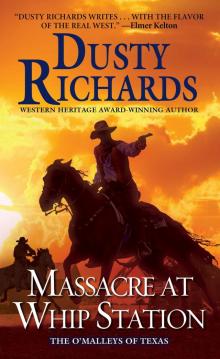 Massacre at Whip Station
Massacre at Whip Station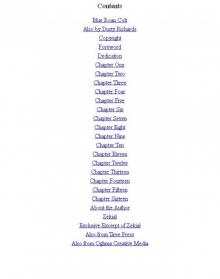 Blue Roan Colt
Blue Roan Colt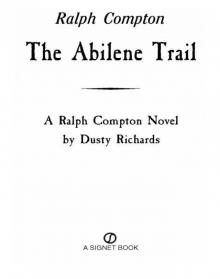 The Abilene Trail
The Abilene Trail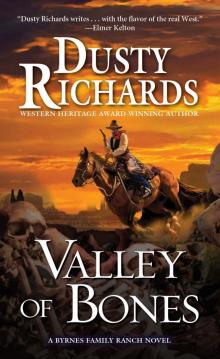 Valley of Bones
Valley of Bones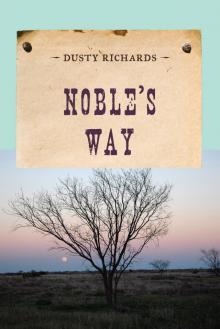 Noble's Way
Noble's Way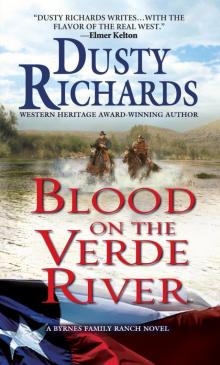 Blood on the Verde River
Blood on the Verde River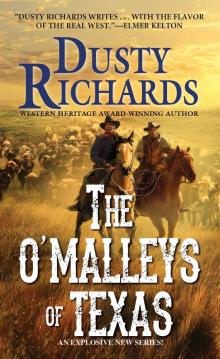 The O'Malleys of Texas
The O'Malleys of Texas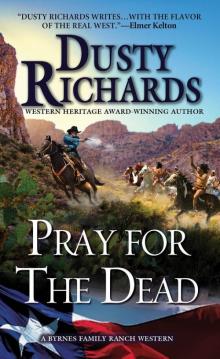 Pray for the Dead
Pray for the Dead Arizona Territory
Arizona Territory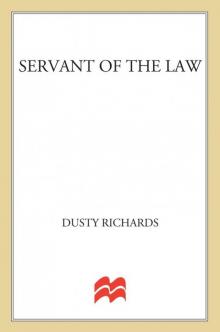 Servant of the Law
Servant of the Law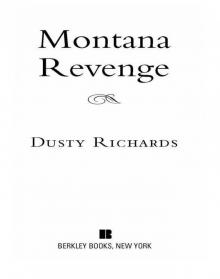 Montana Revenge
Montana Revenge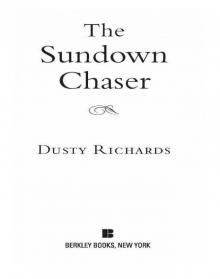 The Sundown Chaser
The Sundown Chaser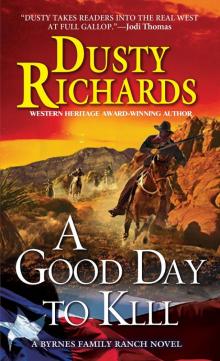 A Good Day To Kill
A Good Day To Kill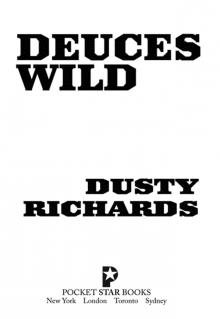 Deuces Wild
Deuces Wild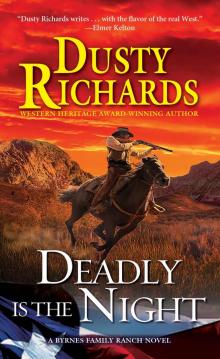 Deadly Is the Night
Deadly Is the Night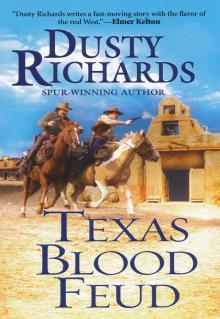 Texas Blood Feud
Texas Blood Feud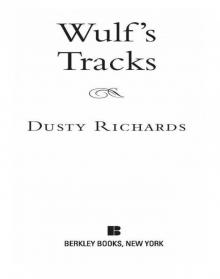 Wulf's Tracks
Wulf's Tracks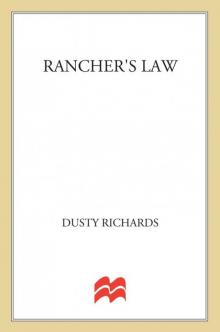 Rancher's Law
Rancher's Law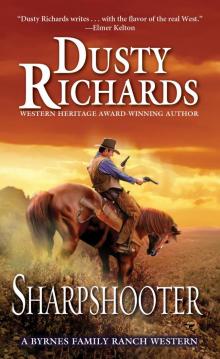 Sharpshooter
Sharpshooter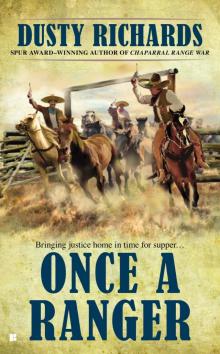 Once a Ranger
Once a Ranger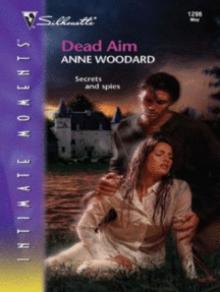 Dead Aim
Dead Aim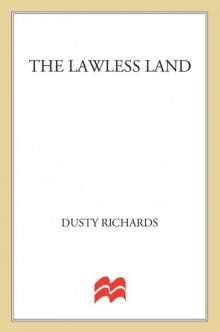 Lawless Land
Lawless Land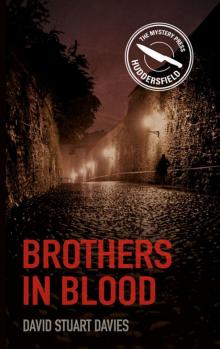 Brothers in Blood
Brothers in Blood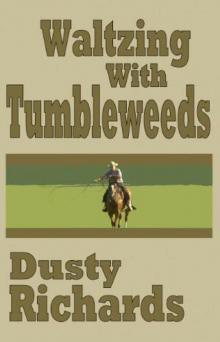 Waltzing With Tumbleweeds
Waltzing With Tumbleweeds